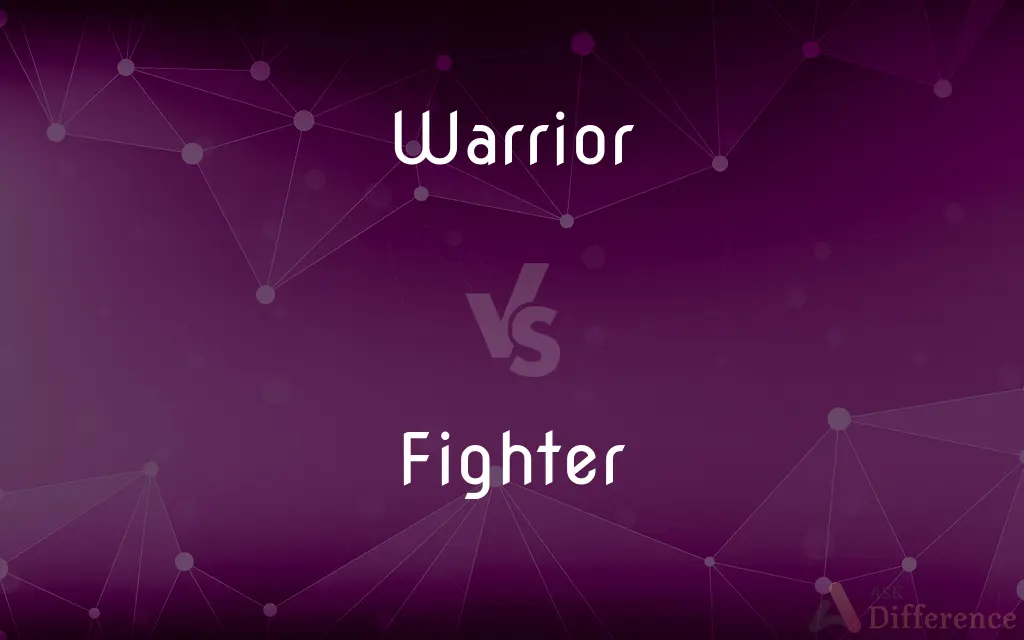Warrior vs. Fighter — What's the Difference?
By Urooj Arif & Fiza Rafique — Updated on March 7, 2024
A warrior is often associated with someone who engages in battle as part of a larger cause or within a cultural or historical context, while a fighter is a broad term for anyone who fights, regardless of the reason or setting.

Difference Between Warrior and Fighter
Table of Contents
ADVERTISEMENT
Key Differences
Warriors typically have a specific code of honor or set of traditions they follow, embodying the values of their culture or group. They may fight as part of an organized army, tribe, or society and their combat skills are usually part of a larger social or spiritual identity. Fighters, on the other hand, are defined more by the act of fighting itself than by any particular ethos or affiliation. This term can apply to anyone engaged in physical combat, including professional athletes in combat sports, individuals defending themselves in a conflict, or participants in informal or unstructured fights.
Historical examples include samurai, knights, and tribal warriors, each with their own distinct ethos and role within their societies. Fighters may possess skills in various martial arts or combat techniques, but their motivations can range widely from personal defense to competitive success.
While warriors are often revered for their bravery and adherence to a code, fighters are recognized for their combat skills and determination. The concept of a warrior can carry a romantic or idealized connotation, emphasizing a noble cause or the defense of one's community, whereas being a fighter is a more general descriptor that emphasizes capability and action in physical confrontations.
Both warriors and fighters embody the human capacity for resilience and strength in the face of adversity. However, the distinction lies in the warrior's integration into a wider social or cultural tradition, and a fighter's more individualistic or varied motivations for engaging in combat.
Comparison Chart
Definition
Engages in battle as part of a cause or tradition.
Anyone who fights, regardless of reason.
ADVERTISEMENT
Ethos
Follows a code of honor or set of traditions.
Motivated by personal reasons or professional goals.
Context
Often part of an organized group or society.
Can be part of structured or unstructured conflicts.
Motivation
Fighting for a larger cause or societal role.
Fighting can be for defense, competition, or personal reasons.
Examples
Samurai, knights, tribal warriors.
Martial artists, soldiers, self-defense situations.
Compare with Definitions
Warrior
May be associated with historical or mythical figures.
The legendary warriors of ancient Greece were admired for their valor.
Fighter
Emphasizes individual capability and resilience.
Despite the odds, the fighter persevered and won the match.
Warrior
A person engaged in or experienced in warfare, often part of a structured societal role.
The warrior took up arms in defense of his homeland.
Fighter
An individual who engages in physical combat, which can be for various reasons.
The fighter trained daily to excel in mixed martial arts competitions.
Warrior
Often revered in their communities for bravery and skill.
The tribal warrior was celebrated for his courage in battle.
Fighter
Does not necessarily follow a broader cultural or ethical code.
Street fighters may engage in combat without any formal code of honor.
Warrior
Typically adheres to a specific code of conduct or ethics.
As a samurai warrior, he followed the Bushido code.
Fighter
Can be involved in both legal (sports, defense) and illegal (unlicensed fights) activities.
Fighters in illegal underground fights face significant risks.
Warrior
Represents a blend of physical prowess and cultural identity.
Warriors in the Viking society were central to their community's ethos.
Fighter
Skills can be self-taught, formally trained, or professionally developed.
The fighter mastered several martial arts to improve his technique.
Warrior
A warrior is a person specializing in combat or warfare, especially within the context of a tribal or clan-based warrior culture society that recognizes a separate warrior class or caste.
Fighter
One who fights, such as a soldier or boxer.
Warrior
One who is engaged in or experienced in battle.
Fighter
A fast, maneuverable combat aircraft used to engage enemy aircraft.
Warrior
One who is engaged aggressively or energetically in an activity, cause, or conflict
Neighborhood warriors fighting against developers.
Fighter
A pugnacious, unyielding, or determined person.
Warrior
A person who is actively engaged in battle, conflict or warfare; a soldier or combatant.
Fighter
A person who fights; a combatant.
Warrior
(figuratively) A person who is aggressively, courageously, or energetically involved in an activity, such as athletics.
Fighter
A warrior; a fighting soldier.
Warrior
A man engaged or experienced in war, or in the military life; a soldier; a champion.
Warriors old with ordered spear and shield.
Fighter
A pugnacious, competitive person.
Warrior
Someone engaged in or experienced in warfare
Fighter
(eulogistic) A person with a strong determination to resist protracted or severe adversity, especially illness.
Fighter
A class of fixed-wing aircraft whose primary purpose is to shoot down other aircraft, sometimes accompanied by a secondary purpose of attacking ground targets.
Fighter
A participant in boxing or any martial art.
Fighter
(colloquial) A firefighter.
Fighter
(video games) A game with a focus on physical combat.
Fighter
One who fights; a combatant; a warrior.
Fighter
A boxer; a pugilist.
Fighter
A person with the determination and will to persist through great difficulty to achieve a goal; one with the courage to fight and resist an opponent, and to struggle with all one's powers.
Fighter
A military aircraft designed to seek out and destroy enemy aircraft; it is usually smaller and more maneuvarable than aircraft designed specifically for bombing. However, hybrid fighter-bomber aircraft that perform both functions also are used.
Fighter
Someone who fights (or is fighting)
Fighter
A high-speed military or naval airplane designed to destroy enemy aircraft in the air
Fighter
Someone who fights for a cause
Common Curiosities
Can a person be both a warrior and a fighter?
Yes, individuals can embody both roles, depending on their context, motivations, and adherence to cultural or personal codes of conduct.
Are warriors always part of an organized society or group?
While traditionally warriors are part of structured societies or groups, the term can also apply to individuals who adopt a warrior ethos independently.
Is being a warrior dependent on historical or cultural context?
While the concept of a warrior is often rooted in specific historical or cultural contexts, modern interpretations can apply the warrior ethos to contemporary figures or roles.
Why do people aspire to be warriors or fighters?
Individuals may aspire to these roles for reasons ranging from personal fulfillment, cultural heritage, professional ambition, to the desire to protect or compete.
Can the concept of a warrior exist in modern times?
Yes, modern warriors exist in various forms, including soldiers with a strong sense of duty, athletes who see their discipline as a calling, and individuals who fight for causes they believe in.
What distinguishes a warrior from a fighter?
A warrior is typically part of a larger cause or tradition with a specific code, while a fighter engages in combat for various personal or professional reasons.
Do all fighters engage in physical combat?
Yes, the term fighter inherently involves engaging in some form of physical combat, whether in sports, self-defense, or other contexts.
How are warriors and fighters perceived differently in society?
Warriors are often idealized for their bravery and adherence to a noble cause, while fighters might be admired for their skill and determination, irrespective of a broader societal role.
How does society honor warriors and fighters?
Society may honor these individuals through recognition of their achievements, commemoration of their contributions, and celebrating their skills in cultural or sporting events.
Are the skills of a warrior and a fighter the same?
While there can be overlap in combat skills, the training, application, and philosophy behind those skills may differ between warriors and fighters.
Share Your Discovery

Previous Comparison
Position vs. Occupation
Next Comparison
Implementation vs. RolloutAuthor Spotlight
Written by
Urooj ArifUrooj is a skilled content writer at Ask Difference, known for her exceptional ability to simplify complex topics into engaging and informative content. With a passion for research and a flair for clear, concise writing, she consistently delivers articles that resonate with our diverse audience.
Co-written by
Fiza RafiqueFiza Rafique is a skilled content writer at AskDifference.com, where she meticulously refines and enhances written pieces. Drawing from her vast editorial expertise, Fiza ensures clarity, accuracy, and precision in every article. Passionate about language, she continually seeks to elevate the quality of content for readers worldwide.















































